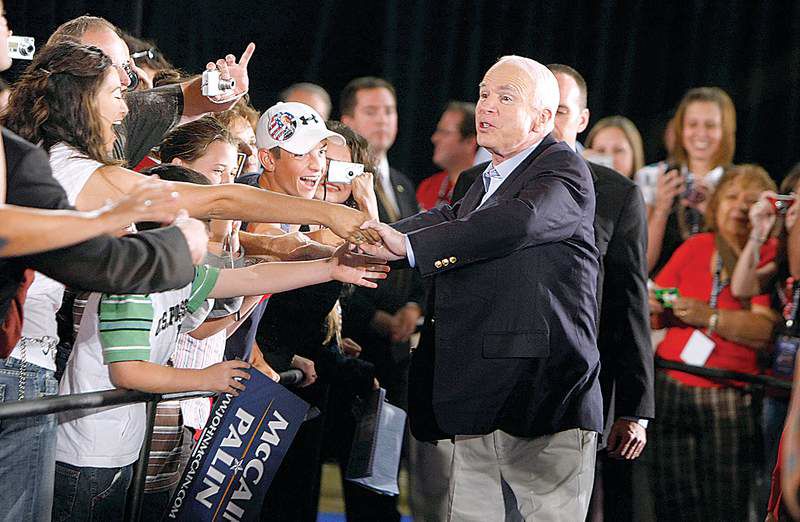Without a plan B, House reluctantly passes bailout
Published 5:00 am Saturday, October 4, 2008

- In the past two weeks, both presidential candidates had not only aligned themselves with an unpopular rescue plan, they had actively worked for the bill’s passage. Above, John McCain greets a town hall audience Friday in Pueblo, Colo. Below, Barack Obama meets students Friday at Springfield Township Elementary School in Springfield Township, Pa.
WASHINGTON — With his television off, Henry Paulson was in his corner office at the Treasury Department early Monday afternoon when Chief of Staff Jim Wilkinson poked his head into the Treasury secretary’s office to tell him the stunning news: The House had just defeated the Wall Street rescue plan that Paulson had helped craft.
Within minutes, Paulson was on his way across the street to the White House for a meeting in the Roosevelt Room with the administration’s economic team. Before everyone had taken their seats, the former Goldman Sachs chief began firing off options.
Should they push for an immediate vote in the Senate? Should the Democratic leaders be flashed a green light to put together a bill that they could pass on their own, without Republicans? Should they make small changes to win over the dozen or so votes they would need on a second try in the House?
Forty-five minutes into the meeting, they were joined by President Bush, who asked the one question no one had considered: If his plan is not working, what is Plan B?
Paulson delivered the answer his boss did not want to hear: There is no Plan B. The Treasury Department and the Federal Reserve had stretched their authorities to the limits, employing obscure powers never before used to keep their fingers in the dikes. The rescue package had to pass.
‘There is no joy’
Friday, when the House reversed itself and approved the package by a 92-vote margin, there was little cause for celebration. Lawmakers had just taken one of the most painful and politically damaging votes of their lives. The stock market was sliding.
Many at Paulson’s Treasury had already moved on to the next big news out of the financial markets: the sale of Wachovia Bank to Wells Fargo.
“There is no joy,” said Rep. Sue Myrick, R-N.C., a rock-ribbed conservative who switched her “no” vote to a “yes” Friday, even though a Democratic surge in North Carolina is making her once-easy district look increasingly dicey. “I’m not going to defend the bill. … I had to do the right thing, even though, politically, it might kill me.”
In some sense, the crisis atmosphere that has gripped Washington during its struggle to deal with the damage to world financial markets brought out the very worst in the city, precisely the chaotic, partisan atmosphere that voters seem so ready to punish at the polls. It also brought out political selflessness and courage, bipartisan cooperation and ultimately a triumph of sorts.
But as drama, it seemed to capture the vacuum caused by an administration in its last months, a bitterly contested presidential race and a Congress facing its own uncertain future at the polls. There were rebellions from left and right, and power struggles between committee leaders from the House and Senate.
Paulson worked himself to the brink of collapse trying to bring about a deal but often seemed his own worst enemy, with a political tin ear that infuriated lawmakers and frustrated administration allies.
On the edges were the two presidential candidates, Barack Obama and John McCain, each following type: Obama playing it low-key, working the phones, coming to Washington only when necessary; McCain suspending his campaign, bounding into the action as a self-assigned mediator above politics, then appearing lost in the disarray until embracing it, finding an unlikely role as an advocate of sorts for House conservatives who were feeling shut out.
In the end
But in the end, none of these people proved decisive. Instead, for Myrick, it was the Charlotte banker who told her the night before the vote about how the credit market in North Carolina was heading toward rigor mortis. It was the woman in Cleveland, Tenn., who told Tennessee Republican Rep. Zach Wamp, “I appreciate you voting no, but please don’t come home and leave things the way they are.”
And it was Drew Greenblatt, president of Marlin Steel Wire Products, who walked into Rep. Elijah Cummings’ office Thursday to tell the Maryland Democrat’s staff that his company had just landed a major contract for wire baskets, but when he went to the bank to get cash to meet the demands, he learned his credit line had been frozen.
“I decided late last night,” Cummings said Friday, just after he switched his vote. “I prayed on it, because this is a difficult situation. I needed to allow this moment in history to sink in.”






